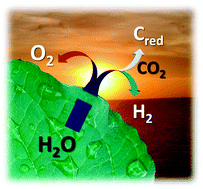Molecular artificial photosynthesis
Abstract
The replacement of fossil fuels by a clean and renewable energy source is one of the most urgent and challenging issues our society is facing today, which is why intense research has been devoted to this topic recently. Nature has been using sunlight as the primary energy input to oxidise water and generate carbohydrates (solar fuel) for over a billion years. Inspired, but not constrained, by nature, artificial systems can be designed to capture light and oxidise water and reduce protons or other organic compounds to generate useful chemical fuels. This tutorial review covers the primary topics that need to be understood and mastered in order to come up with practical solutions for the generation of solar fuels. These topics are: the fundamentals of light capturing and conversion, water oxidation catalysis, proton and CO2 reduction catalysis and the combination of all of these for the construction of complete cells for the generation of solar fuels.

- This article is part of the themed collections: Primer and Catalysis for Production of Renewable Energy

 Please wait while we load your content...
Please wait while we load your content...